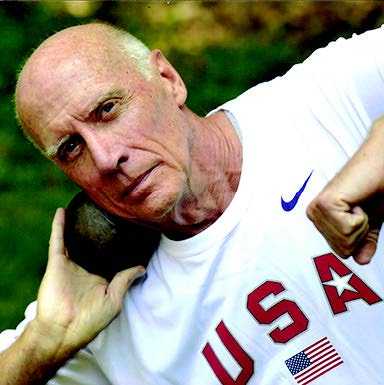 OLIVER LEE MCCABE III, Ph.D., is a board-licensed psychologist with a master’s degree from George Washington University and a doctorate from the Catholic University of America. His career has spanned a broad range of professional activities, including pharmacotherapy research, graduate teaching, clinical practice, business consultation, healthcare administration, and public health systems research. While mostly retired, Dr. McCabe continues to teach his longstanding seminars in “Systems-based Care” with 3rd year residents in the Johns Hopkins Department of Psychiatry and Behavioral Sciences.
OLIVER LEE MCCABE III, Ph.D., is a board-licensed psychologist with a master’s degree from George Washington University and a doctorate from the Catholic University of America. His career has spanned a broad range of professional activities, including pharmacotherapy research, graduate teaching, clinical practice, business consultation, healthcare administration, and public health systems research. While mostly retired, Dr. McCabe continues to teach his longstanding seminars in “Systems-based Care” with 3rd year residents in the Johns Hopkins Department of Psychiatry and Behavioral Sciences.
Early in his career, as Chief of Addiction Research at the Maryland Psychiatric Research Center, Dr. McCabe conducted federally-funded clinical investigations with LSD-type drugs, opiate agonists (methadone, LAAM) and antagonists (cyclazocine, naloxone hydrochloride [‘Narcan’]). Due to numerous societal, regulatory, and political developments, the research program for opiate and alcohol addiction (and other psychiatric conditions) using LSD at the MPRC was concluded in the late 1970s. There was an interval of a quarter century before rigorous research was resumed with these compounds, led by the work with psilocybin by Dr. Roland Griffiths at Johns Hopkins.
Dr. McCabe’s affiliation with Johns Hopkins dates to 1978 when, as an Assistant Professor in Psychiatry’s Division of Behavioral Biology, he worked on the renowned “Precursors Study.” Dr. McCabe subsequently founded and directed the Psychological Sciences Institute (PSI), the largest multi-disciplinary, multi-site behavioral health group practice in the region. PSI was purchased by a private psychiatric hospital in 1990, with Dr. McCabe continuing as director of the hospital’s outpatient department and clinical network.
Dr. McCabe returned full-time to Johns Hopkins in the mid-1990s to direct the Department of Psychiatry and Behavioral Science’s Office of Behavioral Healthcare, responsible for leading the department’s successful adaptation to a rapidly changing healthcare marketplace. More recently, working in the Department of Mental Health in the Johns Hopkins Bloomberg School of Public Health, he conducted disaster preparedness research supported by the Centers for Disease Control and Prevention (CDC). He led the development and validation of a national, dual-intervention model for fostering societal preparedness for broad-scale public health emergencies, involving the training of lay communities in disaster planning and psychological first aid.
Dr. McCabe has held numerous leadership positions in professional organizations, advisory committees, and expert panels. Representative activities and awards that speak to the diversity of his community and professional contributions include:
• Co-founder and Director, Epoch Counseling Centers, Friends Research Institute,
Inc, 1971, an outpatient substance abuse treatment program for youth that has
operated continuously for nearly 50 years and, through several acquisitions, has
evolved to a multi-site network of community clinics
• President, Maryland Psychological Association (MPA), 2003-2004
• Recipient, Award for Outstanding Professional Contributions to Psychology, MPA,
2007
• Co-Chair, Governor Robert Ehrlich’s Maryland Task Force for the Needs of Persons
with Mental Illness and Co-Occurring Substance Use Disorders, 2004-2006
• Editorial Board Appointee, The American Journal of Disaster Medicine, The
International Journal of Emergency Mental Health and other scientific journals
• Recipient, Award for Collaborative Outreach in the Field of Crisis Response,
International Critical Incident Stress Foundation, 2007
• President, Academic Behavioral Health Consortium (ABHC), a national network
of US academic departments of psychiatry promoting quality of mental health care
through academy-directed managed care, 2007-2010
• Chair, National Workgroup to Develop a Competency-based Training Model of
Psychological First Aid, sponsored by the CDC and the Association of Schools of
Public Health, 2011-2012
 Dr. McCabe has participated in competitive athletics throughout his youth and adult life, including 20 years of training, teaching, and competing in martial arts (Black Belt, Shotokan Karate). He has been and remains an active participant in track and field competition at regional, national and international levels. In recent years, he has earned Masters All-American awards in the shot put, discus throw, 35-lb weight throw, and throws pentathlon. Representing USA in the 2014 World Masters Association Championships in Costa Rica, Dr. McCabe won 4 gold medals. During the 2019 outdoor season, he medaled in the World Senior Olympics and broke all-time Masters and Senior Olympics shot put and discus records in Maryland, Virginia, and Delaware.
Dr. McCabe has participated in competitive athletics throughout his youth and adult life, including 20 years of training, teaching, and competing in martial arts (Black Belt, Shotokan Karate). He has been and remains an active participant in track and field competition at regional, national and international levels. In recent years, he has earned Masters All-American awards in the shot put, discus throw, 35-lb weight throw, and throws pentathlon. Representing USA in the 2014 World Masters Association Championships in Costa Rica, Dr. McCabe won 4 gold medals. During the 2019 outdoor season, he medaled in the World Senior Olympics and broke all-time Masters and Senior Olympics shot put and discus records in Maryland, Virginia, and Delaware.
 JUDY YIN SHIH, Ph.D., is a retired mental health clinician and health policy researcher who has been active in community service and philanthropic support of education, health care, and the performing arts. She has an M.S. in Clinical Psychology and a Ph.D. in Public Policy with a concentration in Health Policy. The settings of her clinical work have spanned the Medical College of Wisconsin (Neuropsychology), Johns Hopkins Medical School (Child Psychiatry and Alzheimer’s Clinic), Sinai Hospital (Rehabilitation and Traumatic Brain Injury Unit), and private practice. Her professional roles in the area of health policy include Senior Research Analyst at the Center for Health Program Development and Management at UMBC and Project Director at JBS International, where she directed evaluation projects of federally-funded health programs (including HIV/AIDS, mental health, and substance abuse programs).
JUDY YIN SHIH, Ph.D., is a retired mental health clinician and health policy researcher who has been active in community service and philanthropic support of education, health care, and the performing arts. She has an M.S. in Clinical Psychology and a Ph.D. in Public Policy with a concentration in Health Policy. The settings of her clinical work have spanned the Medical College of Wisconsin (Neuropsychology), Johns Hopkins Medical School (Child Psychiatry and Alzheimer’s Clinic), Sinai Hospital (Rehabilitation and Traumatic Brain Injury Unit), and private practice. Her professional roles in the area of health policy include Senior Research Analyst at the Center for Health Program Development and Management at UMBC and Project Director at JBS International, where she directed evaluation projects of federally-funded health programs (including HIV/AIDS, mental health, and substance abuse programs).
After retiring, Dr. Shih served as a docent at the Chinese Garden of The Huntington Library, Art Museum and Botanical Gardens (The Huntington) in California and has focused her interests in art, poetry and music. She has served in leadership roles on various institutional boards including the Advisory Board of the Department of Psychiatry and Behavioral Sciences of Johns Hopkins University School of Medicine, the Board of Trustees of the Southern Oregon University, Board of Governors of The Huntington, the Ashland Branch Board of the American Association of University Women, the Artistic Advisory Council of the Center for New Performance of the California Institute of the Arts (CalArts), the College of Arts and Sciences Alumni Leadership Council of Marquette University, and the Board of Directors of Rogue Community Health Centers in southern Oregon. At the Oregon Shakespeare Festival, she led the Access for All Campaign for the renovation of the theater campus and facilities, making it accessible to all, especially to the hearing and mobility challenged. Earlier this year, she launched a new performing arts initiative, The Three Friends/One Spirit Initiative, at CalArts to promote creative exchanges and development of new works between contemporary Chinese and U.S. based artists. In her philanthropic efforts, Dr. Shih has been a generous supporter of higher education. She created two endowed scholarships (i.e., Judy Yin Shih Scholarship at SOU and the Judy Yin Shih Fellowship for the Advancement of Health Policy Research at UMBC), and two endowed professorships at Johns Hopkins (i.e., the Oliver Lee McCabe III, Ph.D. Professorship in the Neuropsychopharmacology of Consciousness and the Judy Yin Shih, Ph.D. Professorship in Anxiety Disorders).
Dr. Shih is honored to have created this endowed professorship in the name of Dr. McCabe, who has conducted pioneering investigations using LSD for the treatment of addictions. This professorship honors the legacy of research in the neuropsychopharmacology of consciousness and recognizes outstanding researchers who are dedicated to the scientific understanding of psychedelics and their potential for treating mental health disorders and our understanding of consciousness. She congratulates Dr. Frederick S. Barrett as the second recipient of this endowed professorship. As the current Director of the Center for Psychedelic & Consciousness Research at Johns Hopkins, Dr. Barrett has a demonstrated commitment to the vision and mission of the Center and to conducting research that adheres to the highest rigor and ethical standards.
